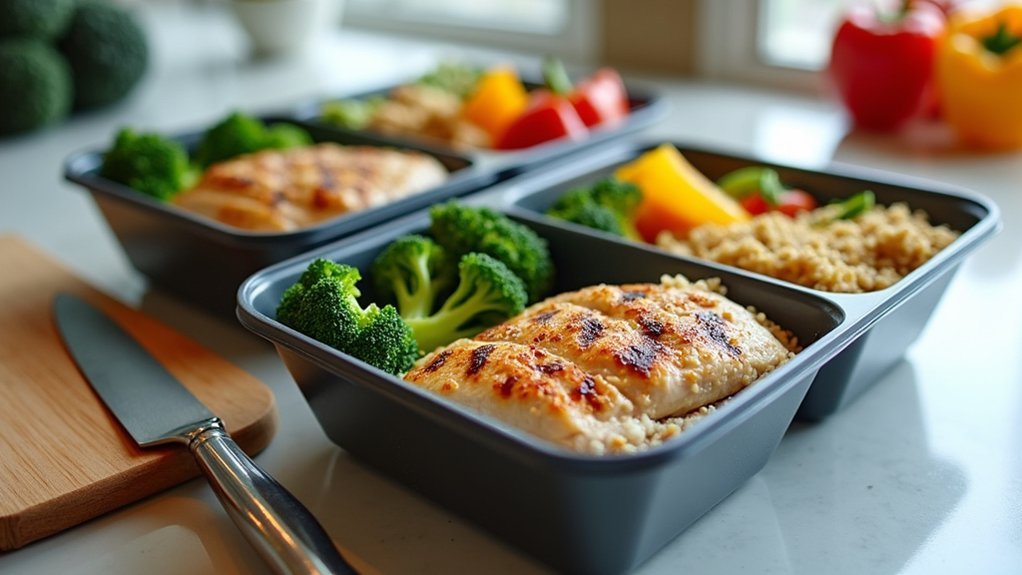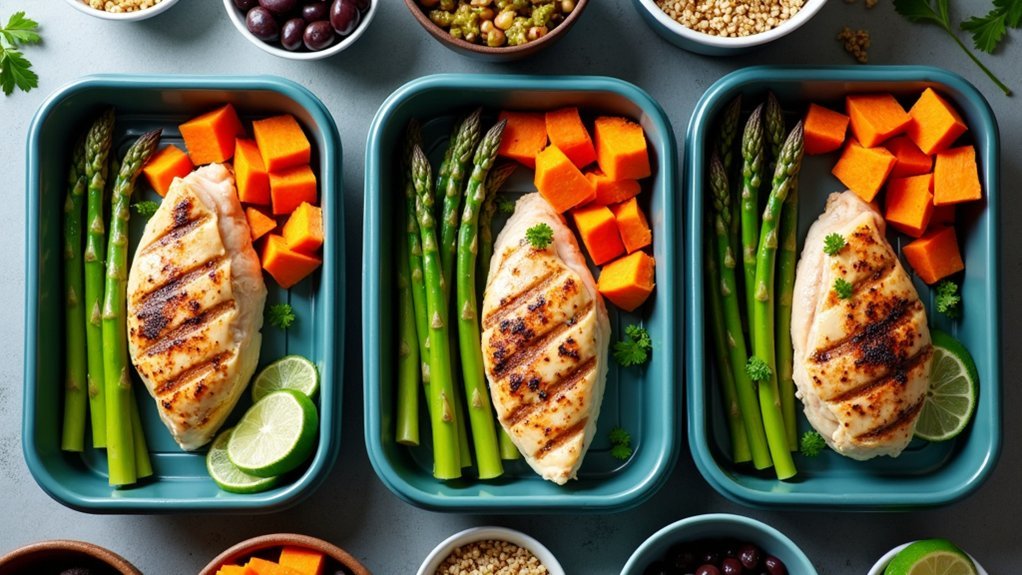Perfect meal prep for mature athletes focuses on protein (1.0-1.2g/kg body weight), complex carbohydrates (60% of diet), and healthy fats (20%), spread across 5-6 daily meals. Prioritize anti-inflammatory foods like berries, turmeric, and tart cherry juice to combat age-related inflammation. Batch cook 2-3 hours weekly, preparing nutrient-dense meals with a 3:1 carb-to-protein ratio for recovery. Your performance advantage lies in timing meals properly—fuel 2-3 hours pre-workout and refuel within 30-60 minutes post-exercise.
Perfect Meal Prep for Mature Athletic Performance

While many athletes understand the importance of nutrition, proper meal preparation becomes even more crucial as you mature in your athletic career.
As your body changes, you’ll need to focus on balanced macronutrients—typically 60% carbs, 20% protein, and 20% fat—while remaining flexible enough to adjust for your specific needs.
Embrace batch cooking and portion control to maintain consistency while saving time.
Select recipes with overlapping ingredients to reduce waste and simplify shopping.
Focus on nutrient-dense foods that support performance and recovery: complex carbohydrates for sustained energy, lean proteins for muscle repair, and healthy fats for hormonal balance.
Aim for three main meals and two to three snacks throughout the day to maintain consistent energy levels during training and competition.
Don’t overcomplicate your approach.
Simple, well-planned meals labeled and properly stored will guarantee you’re fueling efficiently without spending excessive time in the kitchen.
Why Meal Prep Matters More After 40
Aging brings significant physiological changes that directly impact an athlete’s nutritional needs, making meal preparation more essential after 40 than at any earlier stage of athletic development. Your slowing metabolism demands more precise nutrition timing, while your body requires increased protein to maintain muscle mass. Proper meal planning helps athletes achieve optimal nutrient timing benefits supported by research for enhanced performance and improved body composition.
| Challenge | Impact | Solution |
|---|---|---|
| Metabolic slowdown | Weight gain, reduced energy | Strategic meal prep with portion control |
| Muscle preservation | Declining strength, recovery | Higher protein intake planned in advance |
| Hormonal shifts | Altered hunger cues, inflammation | Anti-inflammatory foods prepared weekly |
Meal prep isn’t just convenient—it’s a performance necessity after 40. You’ll experience reduced stress, better recovery, and financial savings while addressing age-specific nutritional challenges. By planning ahead, you’re giving your mature athletic body exactly what it needs, when it needs it.
Age-Specific Nutritional Needs for Active Adults

As your body changes over time, so do the nutritional requirements that fuel peak athletic performance. Your metabolism slows, requiring fewer calories but more nutrient-dense foods.
You’ll need more protein—aim for 1.0-1.2g/kg body weight—evenly distributed throughout the day to combat age-related muscle loss.
Your calcium and vitamin D needs increase to maintain bone density, while B12 absorption decreases, potentially necessitating supplements. Older adults often need fortified foods as B12 absorption becomes less efficient with age.
Don’t overlook potassium for muscle function and heart health, or fiber for digestion despite eating less overall.
Prioritize anti-inflammatory nutrients like omega-3s to support recovery, and time your carbohydrates around workouts for ideal energy.
If you’re managing chronic conditions, you’ll need to balance disease management with performance nutrition while watching for medication interactions with certain nutrients.
Balancing Macronutrients for Optimal Performance
You’ll need to prioritize carbohydrates (60% of your diet) for sustained energy, especially for workouts lasting over 90 minutes.
Timing your protein intake matters—consume 20-25g within 30-90 minutes post-exercise to maximize muscle repair and recovery. Ensure your daily intake meets approximately 1 gram per kilogram of body weight to support overall muscle maintenance and recovery needs.
Include smart fat choices that provide essential fatty acids while maintaining around 20% of your total caloric intake to support hormonal function.
Carbs for Sustained Energy
When athletes need consistent power throughout training sessions and competitions, complex carbohydrates become their most valuable fuel source. Found in whole grains, potatoes, and legumes, these slow-digesting starches provide the sustained energy you’ll need for endurance activities. Ideally, these complex carbohydrates should constitute about 50% of a young athlete’s daily nutrition intake.
You’ll want to consume 30-90 grams of carbs per hour during workouts lasting beyond 60 minutes to maintain blood glucose and delay fatigue. This strategy spares your glycogen stores and enhances your central nervous system function.
As you plan your meals, make carbohydrates the foundation, prioritizing unrefined sources rich in fiber. This approach not only fuels your performance but also supports your recovery by replenishing muscle glycogen.
Protein Timing Matters
Protein isn’t just about how much you consume—timing plays a powerful role in your athletic success. Distributing your protein intake throughout the day maximizes muscle hypertrophy and strength gains from your training efforts.
Strategic consumption windows—before and after workouts, plus before sleep—can greatly enhance recovery and adaptation. Consider pairing protein with carbohydrates in a 4:1 ratio for extended endurance and improved performance, especially during prolonged exercise sessions. The meta-analysis showed that co-ingestion of protein with carbohydrates significantly enhances endurance performance.
Your morning protein intake deserves special attention; higher morning protein relative to your daily total correlates with better muscle development.
While not essential, immediate pre/post workout protein consumption may boost your results. For ideal recovery, incorporate protein into balanced, larger meals that include all macronutrients.
Remember that personalized timing strategies based on your schedule and training needs will yield the best outcomes.
Smart Fat Choices
The strategic integration of dietary fats into an athlete’s meal plan offers substantial performance advantages beyond mere caloric value. As your most energy-dense macronutrient, fats provide double the energy of carbohydrates or proteins, particularly valuable during endurance activities.
Aim to derive 20-30% of your daily calories from quality fat sources like avocados, nuts, and oily fish. You’ll enhance cell membrane integrity, reduce inflammation, and support recovery when you incorporate omega-3 rich foods such as walnuts and flax seeds. Your body also needs adequate fat to absorb fat-soluble vitamins critical for overall health and performance.
Fat adaptation—gradually increasing your dietary fat intake—improves your body’s ability to utilize stored fat for energy, preserving precious glycogen reserves.
Balance is essential; pair healthy fats with appropriate carbohydrates and proteins for ideal performance. Time your fat consumption strategically, particularly before longer-duration events for sustained energy release.
Essential Micronutrients to Combat Age-Related Decline
As you age, mineral deficiencies in iron, zinc, and magnesium become more common and can severely impact your athletic recovery and performance.
You’ll need to strategically incorporate nutrient-dense foods like leafy greens, nuts, and lean meats into your meal prep routine to address these potential gaps.
Creating an antioxidant protection matrix with vitamins C, E, and copper in your meals will help combat age-related oxidative stress and maintain cellular integrity during intense training periods. Consider adding fortified cereals to your breakfast routine, as they provide excellent sources of both iron and vitamin B12 essential for oxygen transport and energy production.
Critical Mineral Deficiencies
While maintaining peak athletic performance as you age, addressing micronutrient deficiencies becomes increasingly essential for preventing performance declines.
Iron deficiency affects 10% of male and 35% of female athletes, compromising oxygen transport and recovery. Watch for signs of fatigue and reduced endurance.
Calcium inadequacy threatens bone density, especially if you’re experiencing menstrual irregularities or heavy sweating.
You’ll need sufficient vitamin D (40-60 ng/mL) to absorb calcium effectively.
Your zinc and magnesium levels directly impact immune function and muscle contractions. Magnesium deficiency is particularly concerning as it’s involved in over 300 processes in both body and brain function.
Heavy training increases requirements for both minerals, with sweating accelerating losses.
Don’t overlook B vitamins, particularly if you’re over 50, as absorption efficiency decreases with age, potentially limiting energy production during workouts and slowing recovery between sessions.
Antioxidant Protection Matrix
Building on our understanding of mineral deficiencies, your antioxidant intake becomes increasingly essential for athletic longevity.
As you age, your body’s natural antioxidant defenses weaken, leaving you more vulnerable to exercise-induced oxidative damage.
To combat this decline and support your performance, focus on these key micronutrients:
- Vitamins C and E – These primary defenders scavenge free radicals during endurance exercise, reducing muscle damage.
- Selenium and zinc – Critical cofactors for antioxidant enzymes that protect cellular DNA and repair mechanisms.
- Beta-carotene and carotenoids – Shield cell membranes from lipid peroxidation during intense training.
- Flavonoids and polyphenols – Enhance your body’s adaptive response while supporting vascular function.
This strategic approach helps prevent chronic oxidative stress which has been directly linked to overreaching and overtraining syndrome in mature athletes.
Time-Efficient Batch Cooking Strategies

For athletes juggling training and recovery demands, efficient meal preparation becomes a competitive advantage. Implement double portion cooking to slash prep time while ensuring consistent nutrition for recovery. You’ll minimize decision fatigue and always have performance-fueling options ready. The quality of your nutrition significantly improves with proper meal planning, which allows you more time for essential recovery activities.
| Strategy | Benefit | Application |
|---|---|---|
| Double Portions | Reduces prep frequency | Cook chicken for dinner plus next day’s wraps |
| Overlapping Ingredients | Minimizes food waste | Use sweet potatoes for dinner and breakfast |
| Quality Containers | Maintains freshness | Store portioned proteins for quick assembly |
| Structured Scheduling | Creates consistency | Dedicate Sunday afternoons for weekly prep |
| Strategic Multitasking | Maximizes efficiency | Roast vegetables while grains simmer |
Pre and Post-Workout Meal Timing Mastery
Mastering the timing of your pre and post-workout nutrition can dramatically impact your athletic performance and recovery. As a mature athlete, your digestive system may need more precise timing to avoid discomfort while maximizing nutrient absorption.
- Plan your full pre-workout meals 2-3 hours before exercise – this gives your body time to digest while providing sustained energy from complex carbs, moderate protein, and limited fats. Eating too close to your workout can cause digestive competition that negatively affects performance.
- Consume quick-energy snacks 45-60 minutes before training when time is limited – focus on simple carbs with some protein.
- Refuel within 30-60 minutes post-workout to capitalize on the anabolic window when your muscles are primed for nutrient uptake.
- Prioritize a 3:1 carb-to-protein ratio after exercise to replenish glycogen stores and support muscle repair.
Anti-Inflammatory Foods and Their Performance Benefits
You’ll find tremendous performance advantages when you include anti-inflammatory foods in your meal prep strategy.
Polyphenol-rich options like berries and green tea actively combat exercise-induced inflammation, helping you train harder with less downtime.
Incorporating omega-3 sources such as salmon and walnuts will greatly enhance your recovery process, allowing for more consistent training and better long-term athletic progress. Distinguishing between acute inflammation that helps repair microinjuries and chronic inflammation is crucial for optimizing your athletic performance.
Anti-Inflammatory Foods and Their Performance Benefits
While many athletes focus primarily on protein and carbohydrates, anti-inflammatory foods provide critical benefits that can dramatically enhance athletic performance.
As you age, inflammation becomes a significant barrier to consistent training and recovery. By incorporating berries, fatty fish, leafy greens, and nuts into your meal prep, you’ll fortify your body’s natural recovery systems. Turmeric, ginger, and cinnamon are excellent anti-inflammatory spices that can be easily added to smoothies, oatmeal, or protein shakes.
- Accelerate your recovery – Consuming anti-inflammatory foods reduces downtime between workouts, allowing you to train more consistently.
- Protect your joints – Prevent the pain and stiffness that can derail your training schedule.
- Boost your energy levels – Minimize fatigue by reducing the inflammatory markers that sap your endurance.
- Build resilience against injury – Lower your risk of overuse injuries that could sideline you for weeks.
Polyphenols Combat Exercise Inflammation
Among the most powerful allies in an athlete’s nutritional arsenal, polyphenols stand out for their remarkable ability to combat exercise-induced inflammation. These compounds protect your muscle tissue by reducing oxidative stress markers and inflammatory cytokines after intense workouts. Polyphenols can enhance endurance performance through their ability to preserve nitric oxide bioavailability in vascular tissue. You’ll experience enhanced recovery and improved aerobic endurance with regular intake.
| Polyphenol Source | Benefits | Recommended Intake |
|---|---|---|
| Blueberries | Reduces muscle damage | 1 cup daily |
| Green Tea | Enhances aerobic capacity | 2-3 cups daily |
| Olive Oil | Modulates inflammatory pathways | 2-3 tbsp daily |
| Dark Chocolate | Improves mitochondrial function | 1-2 squares (85%+) |
| Tart Cherries | Accelerates recovery | 8-12 oz juice daily |
Your gut microbiome transforms these compounds into beneficial metabolites that persist after exercise, supporting metabolic flexibility essential for sustained performance.
Omega-3s Enhance Recovery
Omega-3 fatty acids serve as potent tools in an athlete’s recovery arsenal, directly targeting the inflammatory cascade that follows intense training sessions.
When you consume adequate omega-3s through fatty fish or supplements, you’re strengthening cell membranes while modulating inflammation—allowing for proper adaptation without excessive soreness. Kvarøy Arctic salmon provides an exceptional 2000 mg dose per serving, making it an ideal recovery food for serious athletes.
For ideal recovery benefits:
- Aim for 1-3 grams of EPA/DHA daily – your muscles will thank you with reduced soreness and faster bounce-back between workouts.
- Prioritize consistency over timing – long-term supplementation yields remarkably better results than occasional use.
- Include fatty fish twice weekly – feel the difference as your joints move more freely during training.
- Consider higher doses after particularly grueling sessions – experience the relief when inflammatory markers drop considerably.
Weekly Meal Prep Blueprint for Maximum Energy
To maximize your athletic performance, establishing a structured weekly meal prep blueprint serves as the foundation for consistent energy and ideal recovery. Dedicate 2-3 hours each weekend to prepare staple foods in bulk—lean proteins, complex carbohydrates, and pre-portioned healthy fats.
Plan your week with a 40/35/25 fat-protein-carb split, focusing on low-glycemic foods that stabilize blood sugar. Create three main meals daily plus strategic pre- and post-workout snacks. Store meals in appropriate containers, organizing them by consumption timeframe.
Don’t overlook hydration—prepare water infusions to maintain fluid balance throughout the week. Consider incorporating high polyphenol cocoa as part of your snack options for additional antioxidant benefits. Incorporate omega-3 sources and consider adding performance supplements like creatine to your prep routine.
This systematic approach guarantees you’ll have nutrient-dense, energy-maximizing meals ready when your body needs them most.
Recovery-Focused Recipes for Mature Athletes
As athletes mature, their bodies require specialized nutrition strategies to support ideal recovery and maintain performance. Focus on creating meals with the right macronutrient balance—aim for a 3:1 or 4:1 carb-to-protein ratio to optimize glycogen replenishment and muscle repair. A well-balanced recovery meal should contain at least 2.5 grams of leucine to effectively stimulate muscle protein synthesis.
Incorporate anti-inflammatory ingredients like turmeric, tart cherry juice, and fatty fish to combat exercise-induced inflammation and joint pain.
- Batch-cook lean proteins (chicken breast) and complex carbs (sweet potatoes) for quick assembly of recovery meals when you’re fatigued.
- Blend recovery smoothies with berries, plant protein, and tart cherry juice to reduce soreness.
- Prepare quinoa-chickpea bowls for complete protein profiles that support muscle maintenance.
- Create turmeric-infused soups filled with vegetables to deliver anti-inflammatory benefits and essential nutrients.
Frequently Asked Questions
How Do Hormonal Changes Affect Nutrient Absorption in Athletes Over 50?
Hormonal changes decrease your absorption efficiency, impacting protein, B12, calcium, and iron uptake. You’ll need more nutrients with age, as lower hormone levels reduce your metabolic rate and digestive enzyme production.
Can Meal Prepping Help Manage Medication-Related Nutritional Interactions?
Yes, you’ll find meal prepping invaluable for managing medication-nutrient interactions. It lets you control timing, ingredients, and portion sizes to prevent adverse effects while ensuring your medications work properly and your nutritional needs are met.
What Containers Best Preserve Nutrient Quality in Prepped Meals?
Glass containers with tight-fitting lids are your best choice to preserve nutrients. They don’t leach chemicals, resist temperature changes, and maintain food integrity better than plastic alternatives when storing your prepped meals.
How Should Meal Prep Change During Injury Recovery Periods?
During injury recovery, you’ll need smaller, more frequent nutrient-dense meals. Increase protein and anti-inflammatory foods, prep collagen-rich smoothies with vitamin C, and use containers that make eating easier when mobility’s limited.
Are There Specific Meal Prep Adaptations for Masters-Level Competition Weeks?
During masters competition weeks, you’ll need increased carb-loading, anti-inflammatory foods, extra hydration with electrolytes, and simpler meals. Prep nutrient-dense options that won’t cause digestive issues and support your recovery between events.
In Summary
You’ve now got a tailored meal prep strategy that addresses your changing nutritional needs. By prioritizing anti-inflammatory foods, timing your meals strategically, and balancing your macros, you’ll maximize performance while minimizing recovery time. Consistency is key—implement this blueprint weekly, and you’ll notice improved energy, faster recovery, and sustained athletic performance despite the natural challenges of aging. You’re not just maintaining—you’re optimizing.





Leave a Reply